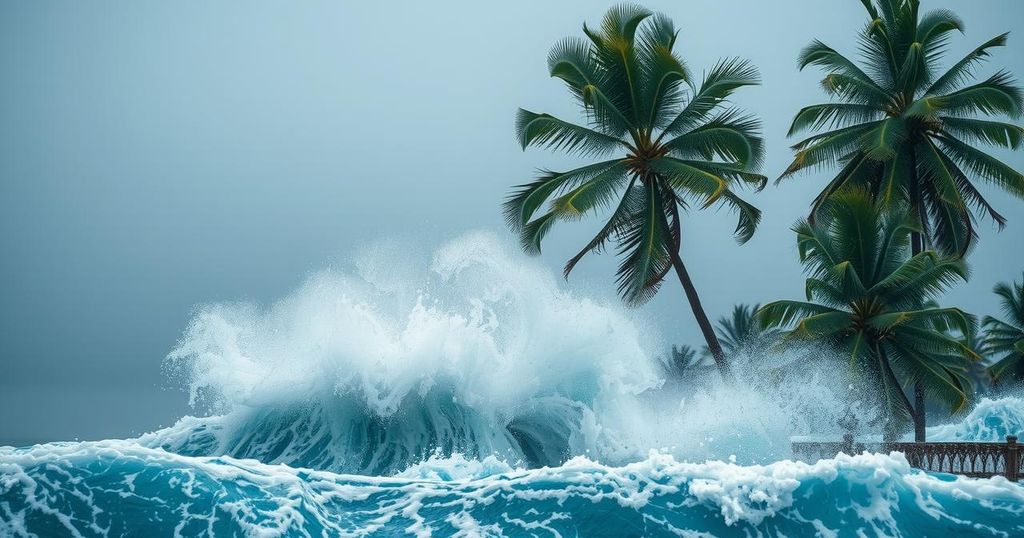World news
AFRICA, CHI, EAGLETON, EMERGENCY RESPONSE, ERATI, FLOODING, HUMANITARIAN AND EMERGENCY OPERATIONS CENTRE, ILHA DE IBO, LOUISE EAGLETON, MARY -, MARY - LOUISE EAGLETON, MONAPO, MONGICUAL, MOZAMBIQUE, NATURAL DISASTER, NATURAL DISASTERS, PEMBA, SADC, SHOC, SOUTHERN AFRICAN DEVELOPMENT COMMUNITY, UNICEF
Daniel O'Connor
0 Comments
Tropical Cyclone Chido Strikes Mozambique, Leaving Destruction in Its Wake
Tropical Cyclone Chido made landfall in Cabo Delgado, Mozambique, on December 15, as a category 4 cyclone with winds reaching 260 km/h and rainfall of 250 mm. It primarily affected Cabo Delgado and Nampula provinces, causing infrastructure damage and downed networks. UNICEF is working to meet urgent needs, delivering essential supplies to impacted families, as the cyclone’s remnants are expected to influence southern Malawi.
On December 15, Tropical Cyclone Chido made landfall in Cabo Delgado Province, Mozambique, at approximately 6 AM, classified as a category 4 cyclone. Located 35-40 kilometers south of Pemba city, it brought destructive winds of up to 260 kilometers per hour and heavy rainfall measuring 250 millimeters within a 24-hour period. The cyclone’s impact primarily affected the provinces of Cabo Delgado and Nampula, resulting in downed mobile networks and significant damage to infrastructure, particularly in Pemba and surrounding regions.
The Southern African Development Community’s Humanitarian and Emergency Operations Centre (SHOC) issued warnings regarding the potential for severe damage, tree uprooting, and compromised infrastructure as the cyclone continued to advance. Officials noted early reports from Nampula concerning house damage; however, assessment of these claims remained pending at that time. As the cyclone’s remnants were anticipated to affect southern Malawi, residents across the impacted areas were urged to stay updated via national weather services.
Mary-Louise Eagleton, UNICEF Mozambique Representative, provided insights on the organization’s response efforts, stating that UNICEF is working diligently to meet the urgent needs of children and families. Ms. Eagleton emphasized, “UNICEF will be delivering lifesaving medicines, water purification supplies, and other essentials to keep people safe and healthy. Many homes, schools, and health facilities have been partially or completely destroyed, and we are working closely with Government to ensure continuity of essential basic services. While we are doing everything we can, additional support is urgently needed to respond to the urgent needs of those impacted by the cyclone.”
The passing of Cyclone Chido also affected the southern regions of the Comoros islands prior to its landfall in Mozambique, where preliminary accounts from Anjouan island reported injuries, household displacement, and infrastructure damage due to flooding. Meanwhile, Moheli experienced only agricultural losses.
As the cyclone progressed, it was forecasted to gradually dissipate near Zimbabwe, demonstrating the wide-reaching effects of such weather phenomena in the southwestern Indian Ocean region.
Cyclone Chido is a significant weather event impacting Mozambique and the surrounding regions. Categorized as a category 4 cyclone at landfall, it has been associated with increased risks including high wind speeds, extensive rainfall, and potential flooding. Understanding the seasonal patterns and historical precedents of tropical cyclones in Southern Africa is crucial for comprehending the potential devastation and emergency response requirements following such storms. Organizations like UNICEF and various regional bodies are actively involved in providing humanitarian assistance to affected populations in the aftermath of such disasters.
In summary, Cyclone Chido has produced devastating impacts on Mozambique, particularly in the provinces of Cabo Delgado and Nampula, with destructive winds and heavy rainfall posing severe risks to residents. UNICEF and government officials are responding to the urgent needs created by this situation, emphasizing the necessity for ongoing support to aid recovery and infrastructure restoration. Warnings remain in place as the remnants of the cyclone continue toward southern Malawi and beyond, reinforcing the importance of preparedness in affected areas.
Original Source: allafrica.com




Post Comment